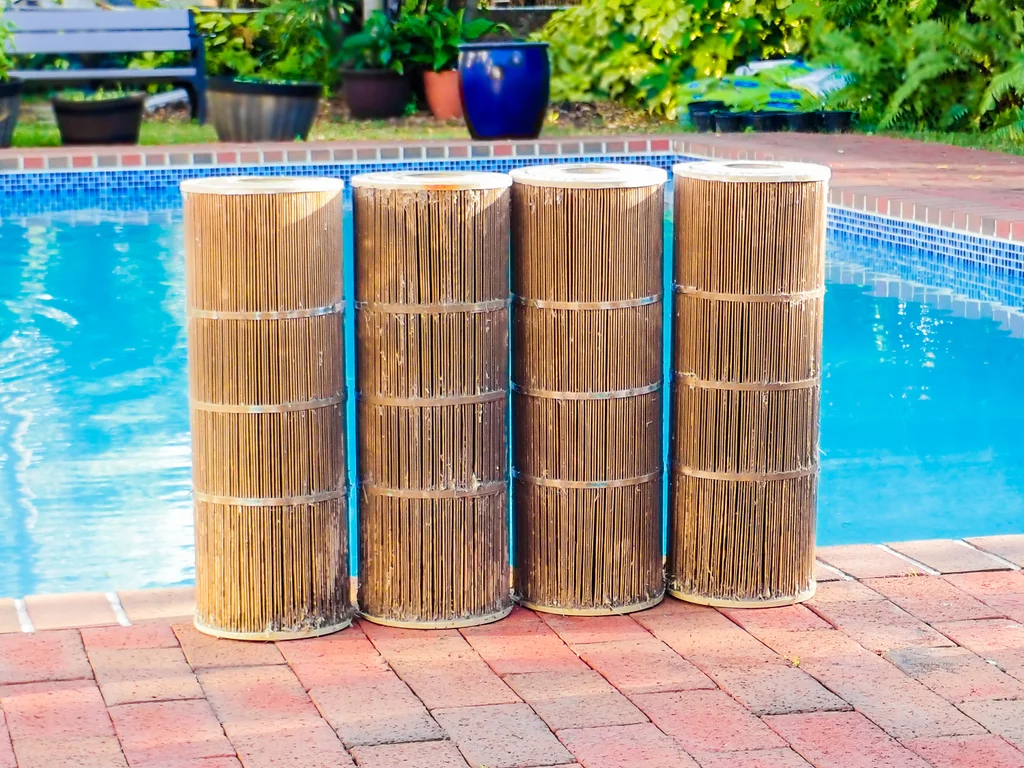Swimming pool filters capture and remove dirt, debris, hair, dead bugs, leaves, etc. It even skims out smaller particles like sunscreen, bacteria, and body oils. Over time, the folds in the swimming pool filter get clogged, which prevents water from flowing properly resulting in pressure within the filter.
When there is a high pressure in the filter, less water volume will be distributed to the pool pump, making it work harder. The harder the pump has to work, the shorter its lifespan will be.
Do you now see the importance of regular pool filter cleaning?
Aside from keeping the pool water clean, pool filters also ensure that the pool chemicals are distributed evenly. Proper cleaning and maintenance of pool filters is necessary to ensure that the rest of the swimming pool will run smoothly.
Having a clean pool filter will save you money, time and energy in the long run.
There are three types of filter systems: sand, D.E. (diatomaceous earth), and cartridge.
This is the most common and affordable pool filter. Sand filters work by pushing the pool water through a tank approximately half-full of silica sand, trapping particles and debris before passing the clean water back into the swimming pool.
Sand filters are long-lasting and easy to maintain. If there’s any drawback with sand filters, it would have to be its effectiveness because they are not capable of trapping the smallest particles without the help of a filter aid.
D.E. pool filters are known to be the most efficient, trapping particles as small as 3-5 microns. The smallest micron the naked eye can see is 35 microns. This pool filter is the most expensive among the three, but has the right to be because it is the most effective.
D.E. filters work by letting the pool water pass through a fine, white powder that’s made from fossils of diatoms, a single-celled aquatic plant. Just like sand filters, D.E. pool filter can be backwashed.
Cartridge filters are easy to maintain. These filters use a cylindrical fan-folded polyester cartridge as the filtering medium. Water flows through the fabric and traps debris in the process.
If you’re looking for “green,” eco-friendly filters, cartridge filters are a good option. They can’t be backwashed so less water is used during the filtration process.

Pool filter cleaning is a process that involves various chemicals that may be harmful if used in appropriate amounts. These chemicals include trisodium phosphate (TSP) and muriatic acid.
Muriatic acid and TSP are highly toxic and require protective gear like goggles, mask, and rubber gloves.
Pool filters literally catch dirt, debris, and other unnecessary particles in the water. A functioning pool filter means having a pool with clean and clear water.
Once a pool filter is malfunctioning, you can expect the water to be dirty and murky in no time.
The status of your pool filter can affect other important parts of the pool. For example, automatic pool cleaners rely on clean filtered water to function properly.
When a pool filter is dirty, the pressure of the pool’s system can be affected, causing a decrease in performance with various parts connected to the plumbing system.
Dirty or incorrectly cleaned pool filters can also lead to premature failure or damage of other components that may result in untimely equipment repairs or replacement.
We recommend pool filter cleaning at least once a month during summer and every month in the winter (if you’re still using your pool on those cold days).
Your swimming pool filter plays a big role in keeping your aquatic recluse up and running.
Bryte Pools pool experts are highly-trained to ensure that your pool filter is clean and well-maintained to keep your water crystal clear.
We are the preferred professional pool cleaning company in Las Vegas, offering a wide range of services with competitive rates.
We’ll take care of pool filter cleaning so you can sit back and enjoy your clean and beautiful swimming pool.